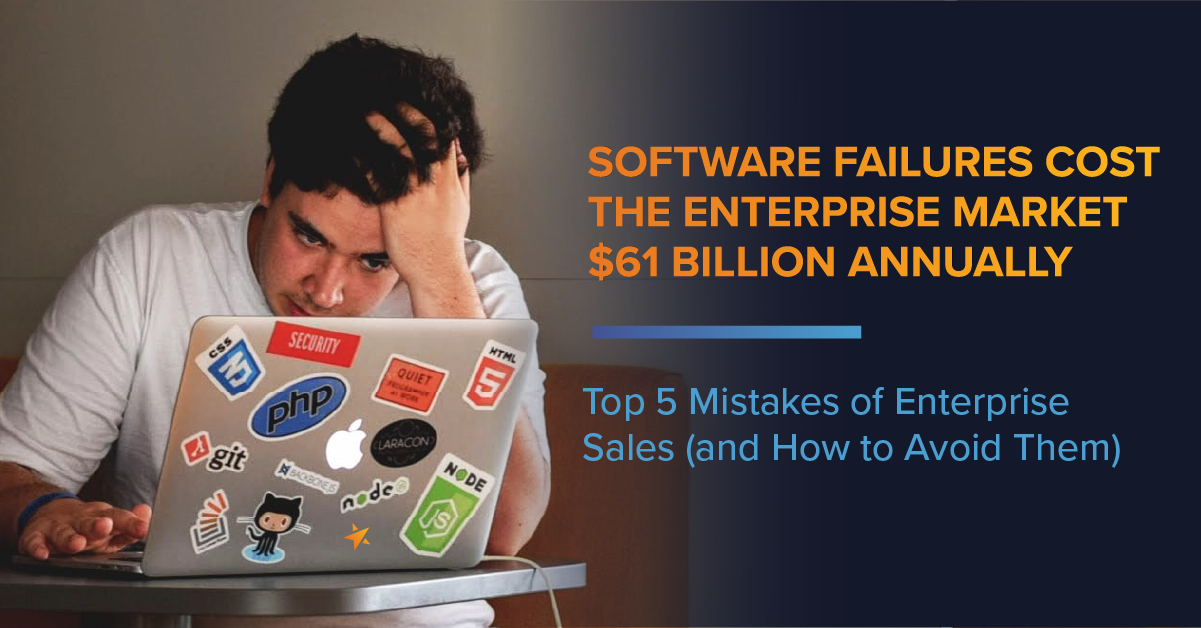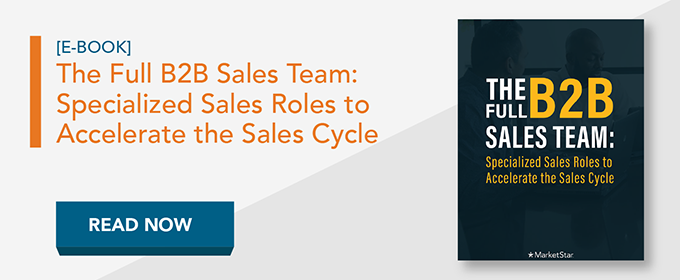
Nobody ever said enterprise sales was easy. Enterprise tech sales is one of the toughest types of sales jobs, no matter whether you are engaging in enterprise software sales, hardware sales, or cloud services. Another industry term for enterprise sales is complex selling because there are so many variables.
Any deal involving enterprise technology tends to involve big-ticket items. The technology also requires vetting for compatibility and integration because failure to execute can be expensive. One study says that software failures cost the enterprise market $61 billion annually. Gartner estimates that 75 percent of all ERP projects fail, and companies spent an average of $5.5 million on failed digital transformation projects in 2020.
Because failed enterprise deployments can be so expensive, they involve more stakeholders and longer sales cycles. Every step of the sales process is closely scrutinized, and there is no room for error. No one wants to pay for choosing the wrong solution.
Here are the five of the most common enterprise sales pitfalls that you should avoid:
Mistake 1: Selling Features, Not Solutions
Enterprise customers aren’t looking for technology; they want solutions. The best enterprise customers have well-defined problems and understand what they need to solve those problems. More enterprise customers are proactive in their search for solutions. Gartner reports that B2B buyers spend 67 percent of their time researching potential solutions and meeting with the buying group before they talk to vendors.
To minimize risk, enterprise buyers want more information. The degree of discovery increases as part of preselection. B2B buyers also demand social proof, so they look for reputable brands and solution providers with a proven track record. That includes your ability to adapt and support customized solutions.
Before going into any enterprise sale, you should assess the prospect’s willingness to adopt new technology. There are five types of enterprise technology buyers:
-
Innovators (2.5%)
-
Early adopters (13.5%)
-
Early majority (34%)
-
Late majority (34%)
-
Laggards (16%)
Few organizations are willing to be guinea pigs for new solutions, so you will need to present proof that you offer a real solution. Having a set of cool features isn’t enough unless the guaranteed outcome meets the specific need.
What buyers really want is a solution to their problem. No matter whether they are willing to try new technology or are only interested in proven products, being able to demonstrate ROI is critical. Your job is to sell the solution to the problem and make a case for ongoing value.
Selling a complete solution is much more effective than selling specific benefits. As part of consultative selling, you want to move away from unique features and talk about problem-solving. The bells and whistles don’t matter if you solve the customer’s problem.
Mistake 2: Insufficient Focus
When beginning an enterprise sales pitch, you want to remove all obstacles in the way of closing the deal. Any stakeholder can object at any time because saying no or not making any decision often seems like a safer course. The best way to head off objections is to know your solution inside and out. It requires ruthless prioritization.
When a prospect tells you “no,” there is an excellent chance they really mean, “I don’t understand how you are going to meet my needs.” You must focus on showing the prospect how your offering specifically meets their needs.
Make sure your solution addresses the problem and demonstrate that you can deliver results. Don’t oversell or sell features you don’t have and assume you can make up for any shortcomings later. Delivering an initial success will open the door to future opportunities. Start by focusing on what you can confidently deliver today.
Mistake 3: Inability to Customize
Few enterprise solutions work out of the box. Customization is a given in any enterprise sales strategy, and success is often the result of personalized service.
Take the time to carefully define the prospect’s problem and map out ways the solution you offer solves that problem. As part of your customization strategy, be sure to address the needs of all the stakeholders. Bring in sales engineers and other resources you may need to address all the technical questions and concerns.
It’s equally important to show commitment following the sale. Have a Customer Success team ready to smooth the way and provide support during and after implementation.
Mistake 4: Bad Timing
In enterprise sales, as in most things, timing is crucial. You need to be ready with the right solution at the right time. Having B2B prospects proactively seek out solutions can help with timing, but the competition is fierce, so you need to be ready to step up when called upon.
You also may be late to the game or behind the market curve. You need to give customers sufficient reason to make a change or add a new solution rather than stick with what they have. If you miss the budgeting cycle or can’t make a sufficiently strong case for a new approach, you may lose out to a competitor or renewal of an existing license.
If your solution is too innovative, you may be ahead of the curve. No one wants to be first to try a new solution, so you may have to offer incentives and additional guarantees to get the sale.
You also may lose out to inertia. If the sales process takes too long, the deal may run out of gas before you can close.
Mistake 5: Overpromise and Underdeliver
Any enterprise sale represents a big commitment for the vendor. Do you have the resources to handle it? Once the deal is closed, will it provide sufficient profits? What’s the potential lifetime value (LTV) of the sale? To meet the customer’s needs, will you have to add more customization and resources than you can afford?
It’s tempting to go after big enterprise contracts, but you have to ask yourself if they are too big. If you sell a solution that you can’t deliver, your customer LTV drops precipitously. You may win the contract and ultimately lose the business, and your reputation may suffer as well. You may do better by seeking out smaller deals that generate immediate revenue.
Agility Is the Key to Enterprise Success
The best way to overcome these types of mistakes is to have sufficient resources. That doesn’t necessarily mean more staff. You can find the right resources from any number of places, including the right Sales as a Service® partner.
Outsourcing enterprise sales can give you access to the right help when you need it. Your outsourced sales partner can provide essential services, such as:
-
Lead qualification: Properly prequalifying enterprise sales leads can save a lot of time and trouble. Prequalification should determine if the prospect is a good fit for the solution, if they have a sufficient budget, if the timing is right, and other factors.
-
Sales support: Having an outsourced sales partner is the easiest way to expand your sales team or bring in additional sales resources without adding staff overhead.
-
Technical support: Rather than keeping sales engineers on staff, your sales partner should be able to provide the technical expertise you need when you need it.
-
Shortening time to market: Hiring the right sales personnel with the right expertise takes time and money, and during the candidate search and hiring process, you don’t have the team you need to close the next deal. Outsourcing enterprise sales support gives you immediate access to experts who can step in and help you right away.
-
Post-sales support: Once you close the deal, you still need to provide onboarding and customer success—both functions that can be readily outsourced to maintain customer satisfaction and secure the relationship.
If you want to avoid common enterprise sales mistakes and learn more about expanding your sales capabilities, be sure to read The Full B2B Sales Team: Specializing Sales Roles to Accelerate the Sales Cycle.










